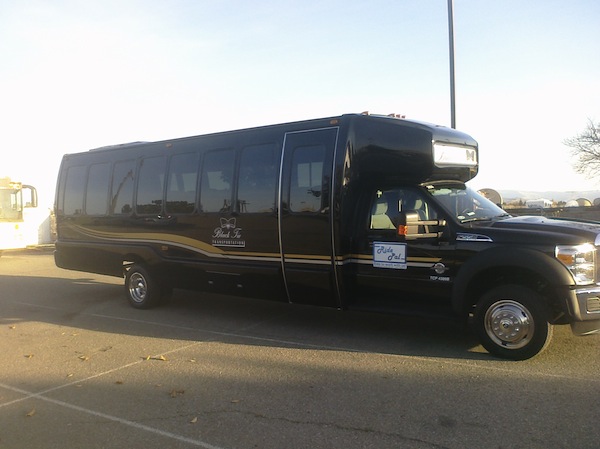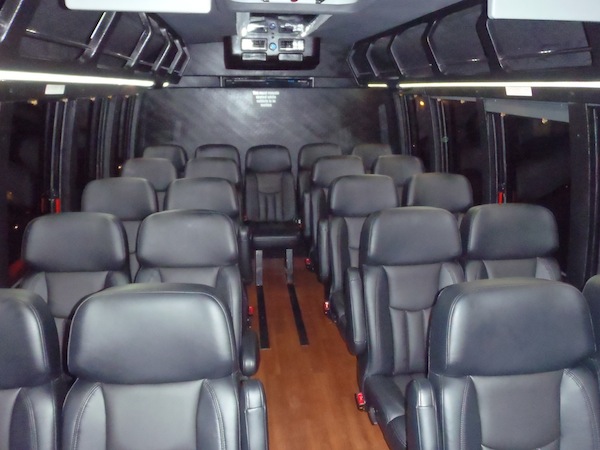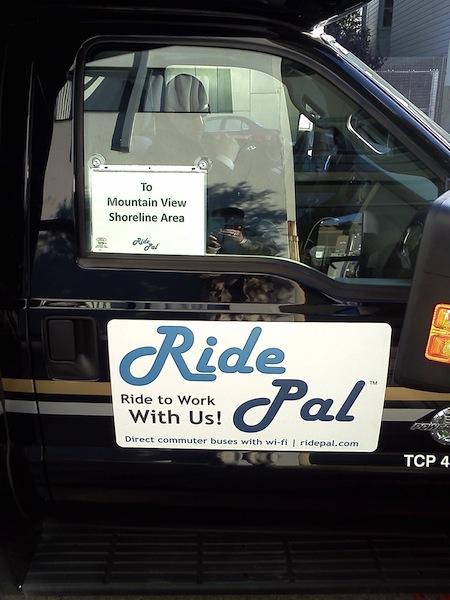If Nathalie Criou has her way, you won’t have to be employed by a tech giant like Apple or Google to experience a business-class morning bus commute. Criou is the CEO and cofounder of RidePal, a San Francisco startup that is working to bring a refreshing green commuting option — complete with leather sets and Wi-Fi — to the road-weary masses.
“We view ourselves as the Virgin America of commuting,” Criou said recently when she sat down for an interview with EarthTechling. The company and service it provides is something of a personal passion for Criou, who had worked in marketing and product management for Google and through experience came to see its famed shuttles as “a thing of beauty.”

Criou went on to work for another company in Silicon Valley that did not offer similar commuter transportation, and soon realized that her commuting options — driving in gridlock or dealing with inconvenient public transit — amounted to an inefficiency she couldn’t deal with. And she didn’t think others should have to deal with it either.
“I couldn’t face the commute and thought, ‘There is a better way to do this,’” she said.
Enter RidePal. For the last year Criou has been doing market research into just how to do offer companies in the region a better way to approach employee transportation. RidePal recently launched four pilot routes in San Francisco, the South Bay and the Peninsula.
RidePal relies on a software platform to coordinate transport, riders and routes. It hires out the bus company and drivers and tells them where to be at which times depending on different clusters of employees taking advantage of the service. Right now, commuters can vote for routes in the San Francisco Bay Area on RidePal’s website. Criou is targeting a range of companies in the same areas so different employees at neighboring companies can ride the same routes. As demand grows and riders register their addresses and other information on the RidePal website, further services and routes can be added.
Companies can reserve a set amount of sets and eventually, single commuters will be able to join a route, similar to taking public transportation and at around the same price. Criou says price depends mainly on the route. A typical trip from San Francisco to Mountain View — around 40 miles — runs about $10 one way. Commuters ride on buses that hold about 30 people, are Wi-Fi-equipped and have leather seats.

RidePal recently announced an agreement to provide clean energy company SolarCity transportation for its employees throughout the Bay Area. SolarCity has thousands of employees and is growing rapidly. That expansion has brought challenges in recruiting qualified employees that don’t want to endure a long commute, and created a parking crunch at the company’s headquarters in San Mateo. That’s where RidePal’s service has created a win-win for everyone involved.
“Using RidePal gives SolarCity employees a more productive, hassle-free commute. We can tailor an affordable service to meet the needs of a wide array of businesses, and we’re proud to have SolarCity as an early customer,” Criou said.
For SolarCity, the initiative is part of company’s ongoing effort to reduce its carbon footprint while also providing additional benefits to employees. By taking the bus rather than driving from San Francisco, each rider can cut carbon dioxide emissions by approximately 600 pounds per year.
“SolarCity is always looking for ways to both reduce its carbon footprint and to make things more convenient for employees,” SolarCity Vice President of Human Resources Linda Keala said in a RidePal blog post. “With RidePal, we are excited to be able to accomplish both with one program.”

Cars, of course, are one of the major producers of CO2. For each gallon of gas that goes into cars, about 20 pounds of carbon dioxide are produced. That means a 40-mile trip from San Francisco to Mountain View could add 30 or 40 pounds of CO2 to the atmosphere, depending on gas mileage.
RidePal hopes to curb those emissions not only in the Bay Area, but around the nation. RidePal is part of the Greenstart Accelerator program and is talking to investors and looking to expand with more routes in the Bay Area – including heading into the East Bay. Croiu said the company will need around $2.5 million to get routes going in the Bay Area before expanding in cities across the nation.
Croiu said the company’s business model is based on two simple facts: there are a lot of people who need to get to a workplace and right now, a lot of them are driving alone in their cars to get there. Those factors sound like nearly every major city in the United States, and those are precisely RidePal’s next targets — the 20 biggest U.S. cities. If all goes well, you might soon be able to spend your daily commute checking your email or reading EarthTechling.